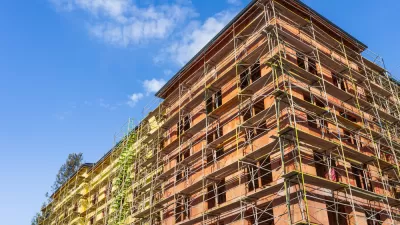The CodeNext project of updating the city of Austin's zoning code and land use policies has faced a controversial and protracted period of public scrutiny. The Allandale neighborhood provides a case study.
Catherine Marfin reports on potential changes to the zoning code in the Austin neighborhood of Allandale, as proposed by the draft of the CodeNext zoning code overhaul.
"Most of the existing regulations for the city’s residential neighborhoods were preserved in the initial draft of CodeNEXT, the overhaul of the Austin’s land use and zoning policies," writes Marfin. "Yet some communities, Allandale more than most, could see far more sweeping changes."
According to Marfin, Allandale is mostly a single-family neighborhood, "established in several phases from the late 1940s to the late 1960s" and "characterized by the post-World War II and midcentury single-family houses, the many original homeowners and the tree canopies lining the streets."
Under CodeNEXT, 80 percent of the neighborhood is zoned as a transect, and residents are concerned that designation strays too far from the single-family zoning currently in place. One building type that could potentially be developed in the neighborhood if it becomes a transect zone: cottage courts. Some residents, as represented by the Allandale Neighborhood Association, have collected their critiques of CodeNEXT into a position paper [pdf]. The question of whether the existing character of the neighborhood has been protected in line with expectation of these residents is obviously still up for debate.
FULL STORY: CodeNext draft proposes major changes for anxious Allandale community

Planetizen Federal Action Tracker
A weekly monitor of how Trump’s orders and actions are impacting planners and planning in America.

Congressman Proposes Bill to Rename DC Metro “Trump Train”
The Make Autorail Great Again Act would withhold federal funding to the system until the Washington Metropolitan Area Transit Authority (WMATA), rebrands as the Washington Metropolitan Authority for Greater Access (WMAGA).

DARTSpace Platform Streamlines Dallas TOD Application Process
The Dallas transit agency hopes a shorter permitting timeline will boost transit-oriented development around rail stations.

San Francisco's School District Spent $105M To Build Affordable Housing for Teachers — And That's Just the Beginning
SFUSD joins a growing list of school districts using their land holdings to address housing affordability challenges faced by their own employees.

Car-Centric LA Suburb Looks to a Train-Oriented Future
City leaders in Rancho Cucamonga, the future western terminus of the Brightline West rail line to Las Vegas, want to reimagine the city as a transit-oriented, pedestrian-friendly community.

New Alaska Bitcoin Mine Would Burn as Much Energy as the State’s Largest Coal Plant
Fueled by “stranded” natural gas, the startup hopes to become the largest in the US, and to make Alaska an industry center.
Urban Design for Planners 1: Software Tools
This six-course series explores essential urban design concepts using open source software and equips planners with the tools they need to participate fully in the urban design process.
Planning for Universal Design
Learn the tools for implementing Universal Design in planning regulations.
Municipality of Princeton
Roanoke Valley-Alleghany Regional Commission
City of Mt Shasta
City of Camden Redevelopment Agency
City of Astoria
Transportation Research & Education Center (TREC) at Portland State University
US High Speed Rail Association
City of Camden Redevelopment Agency
Municipality of Princeton (NJ)





























